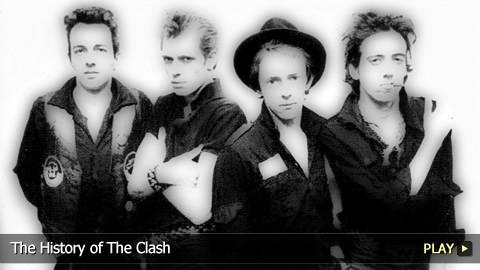The History of The Clash

- They're rockin' the Casbah. Welcome to WatchMojo.com and today, we're taking a look at the history of The Clash.
- Formation
- Record Deal
- Debut
- Topper Headon on Drums
- Give 'Em Enough Rope
- London Calling
- Expanding their Punk Sound
- American Success
- Line-up Changes and Tension
- Last Album
- Break Up
- Death of Joe Strummer
- Musical Legacy
Formation
Punk rock band The Clash formed in London, England in 1976. After leaving their previous musical projects, guitarist Mick Jones, bassist Paul Simonon and drummer Terry Chimes joined vocalist Joe Strummer and guitarist Keith Levene to form the band.
Record Deal
As punk's popularity grew, The Clash spent most of 1976 rehearsing and playing a few shows. Early the next year, they landed a contract with CBS Records.
Debut
When The Clash released their eponymous debut later in 1977, Levene and Chimes were no longer in the lineup. On the strength of the single “White Riot,” the LP charted within the UK's top twenty and introduced the band's angry, dirty punk sound and socio-politically charged lyrics. An import of that self-titled record also achieved massive sales in the U.S., but was only released in an altered version as the band's second American album two years later.
Topper Headon on Drums
By this point, The Clash was headlining in the UK, even though several members had had run-ins with the law. The group then added Topper Headon on drums, and he became their most longstanding drummer. With him, they recorded new material, including the punk classic “Complete Control.”
“Give 'Em Enough Rope”
Next, the band unveiled Give ‘Em Enough Rope. Though it still contained punk vibes and covered contemporary subjects, the LP featured a more mainstream rock sound. At home, the album spawned a top twenty track and reached a number two chart position; but it barely cracked Billboard in the U.S.
“London Calling”
After spreading their musical message on tour, The Clash finally earned more chart recognition in the U.S. London Calling struck a chord with Americans thanks to its mix of punk rock, reggae, rockabilly and jazz. The double-LP received rave reviews and reached the Billboard 200’s top thirty, and today it is considered one of the best albums in history.
Expanding their Punk Sound
After the 1980 standalone single, “Bankrobber,” The Clash followed their musical ambitions by unveiling the triple album, Sandinista! They expanded their brand of punk even further by adding folk, R&B and rap to their left-leaning lyrics. Despite mixed reviews, the effort still managed a top twenty showing in the UK and reached the top thirty in the U.S.
American Success
Following the dub and hip hop-influenced single, “This is Radio Clash,” the band experimented with dance-punk and new wave on 1982’s Combat Rock. That gamble paid off when that album reached number seven on the American charts, making it their highest-charting album in the U.S. The effort also gave them their first and only top ten American hit: “Rock the Casbah.” Meanwhile, the LP went to number two in the UK, while “Should I Stay or Should I Go” topped the charts there when it was re-released in the 1990s.
Line-up Changes and Tension
Unfortunately, the early '80s were filled with tension. This eventually resulted in the dismissals of Headon and Jones. Along with Strummer and Simonon, The Clash continued with drummer Pete Howard and guitarists Nick Sheppard and Vince White.
Last Album
The new lineup played some shows together before dropping 1985's critically and commercially disappointing Cut the Crap. Its only single, “This is England,” was later seen in a more positive light by both fans and critics.
Break Up
But ultimately, tension got the better of them and The Clash broke up in 1986. While members did go their separate ways, they still occasionally worked together, and this caused rumors of a reunion to surface in the '90s. A live album appeared before decade's end, followed by a documentary and some gigs featuring various members early in the new century.
Death of Joe Strummer
Sadly, Strummer died in 2002 of a heart defect, shortly before The Clash’s induction into The Rock and Roll Hall of Fame the next year. Regardless, The Clash's music lived on in numerous compilations and box sets that have since been released.
Musical Legacy
We remember them for their musical passion, their willingness to experiment with genres and styles, and their fearlessness in speaking their minds on socially and politically relevant topics. When it comes to punk rock, The Clash is the only band that matters.
